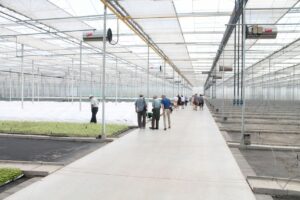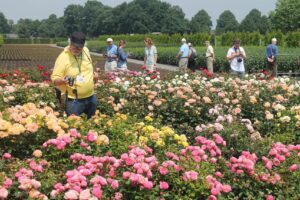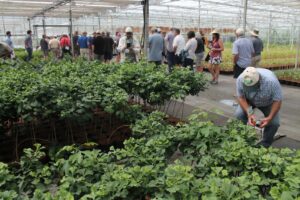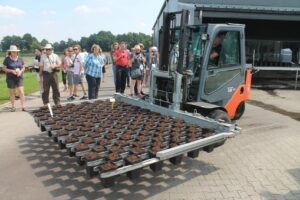Last week the International Plant Propagators Society visited Dutch ornamental industry for the first time in their long history. President Peter MacDonald explains what IPPS stands for.
What is the history of IPPS?
„It began in 1951 in the United States. A group of growers wanted to exchange knowledge about techniques to improve their production quality. IPPS then started under the motto ’Seek and share knowledge’ in three American regions. The idea was that growers did not have to compete with each other, but with the public spending money on holidays – instead of plants.”

And that American motto went across the world?
„Yes, later, a few leading growers in the UK began to talk to each other like IPPS was intended. Then followed by growers from Australia and New Zealand. Different IPPS regions developed worldwide. Recently Japan and South Africa also joined. IPPS now has a total of 1,600 members. Not only growers, but also landscapers, researchers and lecturers like me – I taught plant propagation at Scotland Rural College in Ayr.”
What does IPPS do?
„Since 1951, every year conferences have been organized. They have speakers about all kinds of current topics in plants and cultures. Researchers get feedback on what they do for the industry. Growers meet colleagues from other countries and gives them other ideas, for example to solve similar problems. Lecturers keep in touch with the industry thanks to IPPS. All presentations are being published as papers in an annual book. We publish that online, and as a real book which, for example, can be found in many libraries of colleges.”

Does IPPS also involve students in activities?
„Yes, each year there is a special program for students, IPPS Six Packers. It started in Australia where you buy your beer as a six pack. We found that a funny title, therefore we kept it for our program. This year, ten students participate from countries like Denmark, England, Scotland and the Netherlands. You can apply as a student, or as a young grower. You must show that you are very interested in plant production and your employer must support your application.”
What does the program involve?
„Six packers participate in study tours and conferences. The six packer that impresses our international jury is winning an exchange program with the South-East US IPPS region.”
Each country has organizations for the industry. What’s the difference between IPPS and organizations in your country, such as the Royal Horticultural Society (RHS) and the Horticultural Trades Association (HTA)?
„The RHS is more for the amateur side of horticulture, so for private gardeners. In the UK there are grower groups as in the HTA. But I think growers in the Netherlands are closer together, more organized. I see the international aspect of IPPS is unique in the industry, because you can easily get international contacts via IPPS, both business and social.”

Can you mention an example of a technology that is rapidly spread through IPPS?
„Hot pipe callusing, a technique where graftings are extra heated on the spot. An Oregon professor developed the technique and a local grower saw it. He was an IPPS member and brought it to the UK. Here it was picked up by other growers. Through a Belgian IPPS member, for example, it came quickly in Belgium.”
What is still to be learned about propagation?
„In the past we had tissue culture as a theme in hardy nurserystock. For example, with Rhododendron you can use the technique well, but not with any other crop. There is a surprisingly large range of propagation techniques. For a book I wrote about those techniques in 2014 (The Manual of Plant Grafting, ed.), I visited several nurseries. For example, even if they all are grafting, every grower is working slightly different than the other – and he has always worked like that.”

What are current IPPS topics?
„The mechanization will continue. This ensures a big change in the nursery, as more companies are specialized in propagation, or in growing on. Substrate is also a permanent topic. When I started as a lecturer in 1986, peat was used little. Now there is a tendency for other components such as coir. How does it work for the nursery? There is always a lot to learn. That’s the case with IPPS, but you must be willing to share your own knowledge by telling about it.”
Click here to see visits of IPPS last week in Dutch growing area of Lottum: Rötjes Young Plants, Piet Vergeldt Nurseries and Lakei Nurseries.
Pictures: Arno Engels









